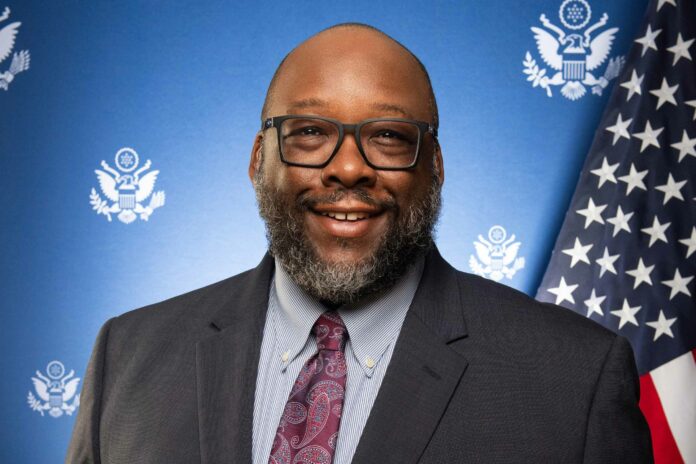
In 1999, 10 years after graduating from the University of Virginia, Arthur Brown returned to the scene of perhaps the most consequential conversation of his life: the office of Dean of Admission John A. “Jack” Blackburn.
There Brown showed Blackburn one of his most prized possessions, a black United States passport emblematic of his status as one of America’s newest foreign service officers.
“I knew you could do it,” Brown recalled the late dean saying.
A quarter-century later, Brown is two months into his tenure as U.S. ambassador to Ecuador, one of nine countries he’s served. But he’s quick to offer that his journey started much more humbly.
From Dirt Road to Dean’s Office
Brown grew up on a dirt road in Keswick. His parents, Emma Frances Arrington Brown and Wardell “Mouse” Brown, both worked at UVA’s hospital. Arthur Brown attended Albemarle High School, where he played football and enjoyed history, government and social studies classes, but wasn’t so keen on other subjects.
In his senior year, his government teacher, a UVA alumnus named Bob Weaver, recruited Brown to go on the annual Model UN trip to New York, where Brown represented Angola, an experience he said “helped form my thinking.”
Another trip, this time to Monticello, also inspired Brown. He learned Thomas Jefferson was a diplomat before he was president. “He went to France, and he was representing our country,” Brown recalled. “And it was one of these things where it’s like, ‘Man, if Jefferson could go to France and represent, I could do it, too.’”
Brown applied to UVA, but his inconsistent high school record proved to be a problem. The Office of Admission replied with the dreaded thin envelope containing a single-page rejection letter.
Brown’s father challenged him to go back to UVA’s admission office. “Are you gonna let those people up at the University tell you that you can’t go to school up there?” Arthur recalled him saying.
So Arthur went back in person and told them they’d made a mistake. “They sent out the regular folks who deal with students who are crying about not getting admitted,” Brown said. “They kicked me to the curb.”
They told him Blackburn was the only one who could change the decision. So, when he got home, Brown opened the phone book, found a listing for “John A. Blackburn” and dialed the number. Rather surprised at Brown’s boldness, Blackburn invited the rejected applicant to meet at his office. They talked through a lot of things, including Brown’s dream of being a diplomat.





















